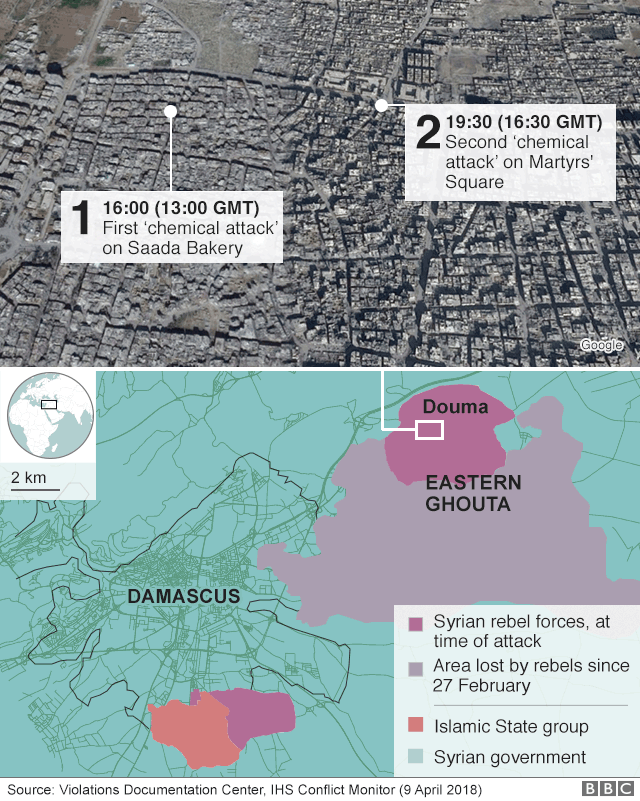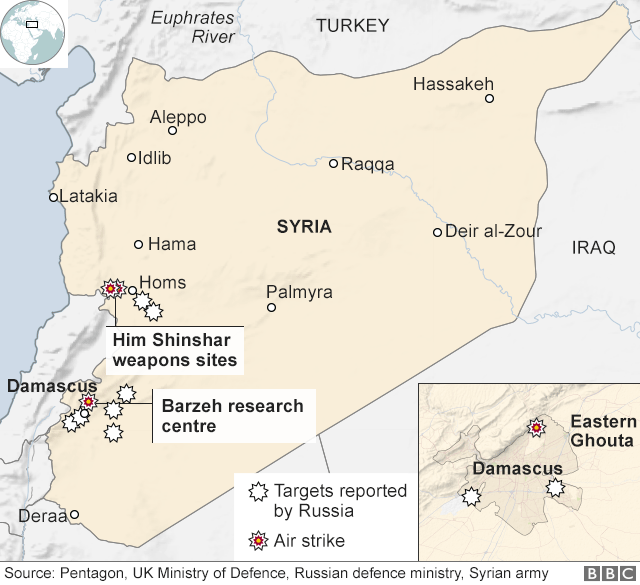
The Organisation for the Prohibition of Chemical Weapons will be given access to an alleged chemical attack site in Syria on Wednesday, Russia says.
Experts arrived in Damascus on Saturday, but they have been unable to visit the nearby town of Douma because of "security issues" cited by Russia.
US officials have raised concerns that Russia, the Syrian government's ally, might have tampered with the site.
The government insists the incident in Douma on 7 April was fabricated.
Opposition activists, medical organisations and rescue workers say more than 40 people were killed when aircraft dropped barrel bombs filled with toxic chemicals on the town while it was still held by rebel forces.
The US, UK and France say that, based on open source information and their own intelligence, they are confident chlorine and possibly a nerve agent were used.
On Saturday, they carried out missile strikes on three targets they said were "specifically associated with the Syrian regime's chemical weapons programme".
Syrian state media is reporting that inspectors have arrived in Douma but this has not been confirmed by the OPCW.
Russian and Syrian officials had cited "pending security issues" for not allowing inspectors to travel to the site of the alleged attack, the global watchdog's director general said on Monday.
Syrian authorities had instead offered the inspectors the chance to interview 22 people who they said were at the location of the alleged attack and could be brought to Damascus for interviews, according to Ahmet Uzumcu.
If the OPCW inspectors are able to travel to Douma on Wednesday, it will have been 11 days since the attack. They are expected to gather soil and other samples to help identify any chemicals that might have been used.
US ambassador Kenneth Ward said at an OPCW meeting at The Hague on Monday that there were fears that Russian forces had tampered with the site after the last rebel fighters were evacuated last week, Reuters news agency reported.
"It is our understanding the Russians may have visited the attack site," Mr Ward was quoted as saying.
"It is our concern that they may have tampered with it with the intent of thwarting the efforts of the OPCW Fact-Finding Mission to conduct an effective investigation."
France's foreign ministry said in a statement on Tuesday that it was "very likely that proof and essential elements are disappearing from this site".
Russian Foreign Minister Sergei Lavrov has denied any interference.
"I can guarantee that Russia has not tampered with the site," he told the BBC.
He said the allegations of chemical weapons use were "based on media reports and social media" and that the incident was "staged".
The Syrian government denies ever having used chemical weapons.
However, experts from the UN and the OPCW have ascribed four chemical attacks to the government during the civil war, including an attack on the rebel-held town of Khan Sheikhoun in April 2017 that involved the nerve agent Sarin.
A correspondent for US network CBS gained access to the alleged attack site in Douma on Monday. Seth Doane spoke to residents of a building where at least 30 bodies are reported to have been found.
"All of a sudden some gas spread around us," one man said. "We couldn't breathe, it smelled like chlorine."
Another resident, who said many members of his family were among those killed, showed the CBS crew a yellow compressed gas canister that appeared to have punched a hole in the roof of the building. The canister looked similar to others photographed in the wake of other alleged chlorine attacks.
A Swedish journalist who also visited the building in Douma said he felt a discomfort in his throat and smelled a strong odour as he entered its basement.
The day of the suspected chemical attack, Douma still under rebel control - the last rebel-held town in the Eastern Ghouta region outside Damascus.
Thousands of people were sheltering in basements from the government's bombardment, when two bombs filled with chemicals were allegedly dropped several hours apart on two separate locations.

The World Health Organization said that according to reports from its medical partners in Douma, an estimated 500 patients presented to health facilities exhibiting signs and symptoms consistent with exposure to toxic chemicals.
There were signs of severe irritation of mucous membranes, respiratory failure and disruption to central nervous systems of those exposed, it added.
More than 70 people sheltering in basements reportedly died, with 43 of those deaths related to symptoms consistent with exposure to highly toxic chemicals, the WHO said.
Late on Friday night in Washington, President Donald Trump announced that he had authorised strikes against Syrian military targets, in co-ordination with the UK and France.
The US military said 105 missiles were launched, and claimed the strikes had set back Syria's alleged chemical weapons programme by years.
Russia said 71 of the missiles were shot down by Syrian air defence systems.
One of the three sites hit was a branch of the Scientific Studies and Research Centre (SSRC) in the capital's Barzeh district, which the US said was a "centre for the research, development, production and testing of chemical and biological warfare technology".
The other two were suspected chemical weapons storage facilities at Him Shinshar, west of the city of Homs.
Nikki Haley, the US permanent representative to the UN, said on Sunday that the Trump administration would sanction Russian companies she alleged were involved in Syria's chemical weapons programme.
But the White House contradicted her on Monday, rejecting any fresh sanctions.
"We are considering additional sanctions on Russia and a decision will be made in the near future," press secretary Sarah Huckabee Sanders said in a statement.

By Lyse Doucet in Aleppo
Syria's national day, its annual celebration of independence, has added resonance this year. Western air strikes have hardened the defiance of pro-government supporters and their long-held conviction that Syria is the target of a Western conspiracy.
The Syrian army's victory in the Eastern Ghouta, the last major rebel enclave around Damascus, has also strengthened President Assad's resolve to finish this war on the battlefield rather than at any negotiating table.
A major concert on Tuesday in Aleppo's majestic citadel, organised by the presidency to mark national day, is meant to sound a loud clear note that the Syrian leader is calling the tune.
Ever since Aleppo was recaptured at the end of 2016, Western and Arab envoys have expressed hope that Russia would exert pressure on its Syrian ally to try to bring about a negotiated solution. That was always in doubt. And this new crisis has now put the West's relationship with Russia at breaking point.